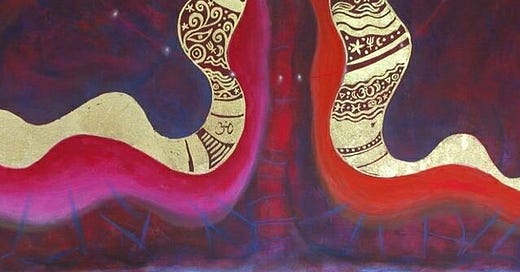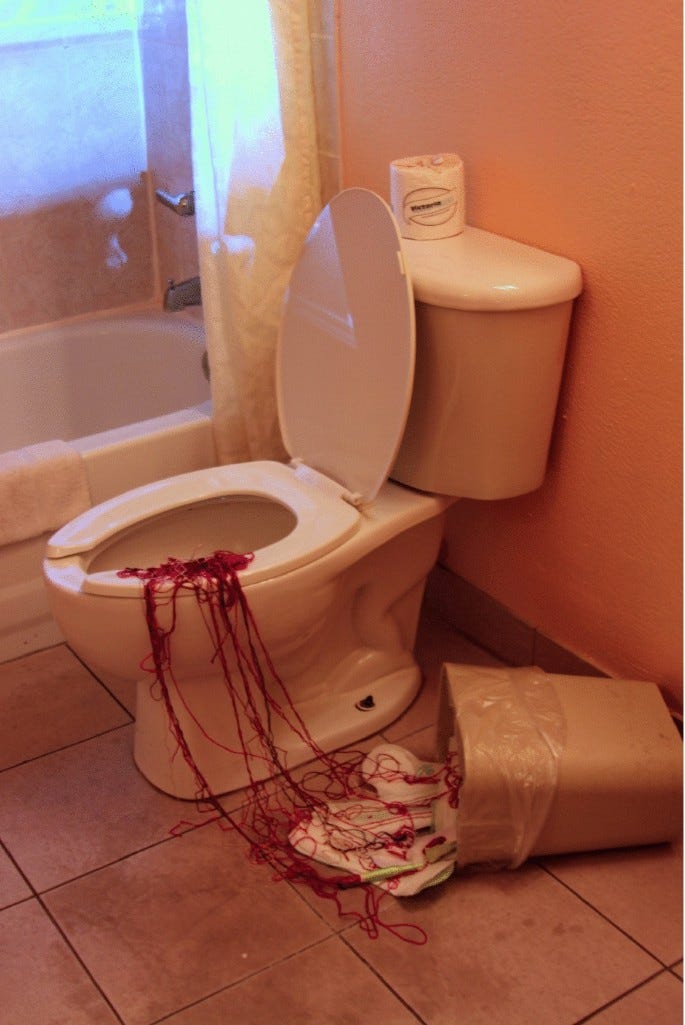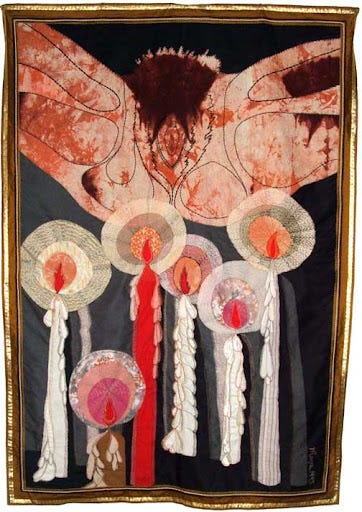I’m writing this on the first days of my bleed. A time of creativity and solitude, symbolic of the season of Winter and the Dark (or New) Moon. I feel more inclined to be alone, stay at home in my ‘cave,’ and feel my body curl inward, yearning to protect my womb and stay contained, creative, and thoughtful.
Menstruation comes as surely as the moon will rise, but shifts with the tides of a woman’s life. A woman’s blood is transformative, powerful and earthly. It holds insight into not only her life, but the red thread connecting her to women in her ancestry and the women surrounding her.
This is true not just in her menstrual blood, which can’t be separated from the blood flowing through the rest of her body. Blood connects and symbolises the entirity of a woman’s life and existence, defining rites of passages and serving as sometimes stark moments of transition and transformation.
I draw on the work of Rachel Reed, derived from her mentor Jane Hardwicke Collings, who outlines the path a woman traverses and the four phases she embodies…
Maiden, Spring, Waxing Moon: from birth to around 25 years
Mother, Summer, Full Moon: from around 25 years to around 50 years
Maga, Autumn, Waning Moon: from around 50 years to 70 years
Crone, Winter, Dark Moon: from 70 years to death
Timelines are fluid for the individual woman, and rites of passages (such as childbirth in the mother phase) do not have to define these. Though many are physical, they aren’t always. A woman can be in her mother phase without having children.
I love this interpretation. And I love that blood is the fluid that’s flowing in all the rites of passages of womanhood. Blood is present when we are born, when we first bleed, when we birth, when we cease menstruation, and when we die.
Our bodies, and everything surrounding it— emotions, intuitions, feelings, thoughts— are interwoven with the movement of blood. In the microcosm of our cycle, we change everyday. In the macrocosm of our life, we transform with each phase. What a gift this is, if we lean into the ebbs and the flows of womanhood… even when things don’t sail smoothly and feel unpredictable, even painful.
As I sit here bleeding, 23 years old and content in my still and slow life, I think of my past in blood. I think of how I lived my life, how I navigated my bleeding, and how I do so now. And I think of how I want to bleed (through the phases) in my future.
You see, blood stories connect women. They reinforce our voice and autonomy, and uphold our power. Blood stories shed light on the experiences we’ve had, making space for conversations in the workplace, families, healthcare systems and society at large. Blood stories help women understand their inclinations and deep-seeded beliefs on blood, and by extension, our bodies and our existence.
Blood Story: My Menarche Experience
Menarche, or a woman’s first menstruation, is a rite of passage within the phase of maidenhood. The response a girl receives to her reaching menarche can shape her experience as a woman in the world, affecting the relationship she has with her body, and how she proceeds in sexual relationships, childbirth, and other rites of passages.
We typically don’t consider this in our culture today– I definitely didn’t…
When I was teenager, general views surrounding menstruation were of disgust, secrecy, disregard and nuisance. This was evident throughout school, media, social media and general overculture of the mid 2010s. Still and all, I was lucky enough to have a mother who kept menstruation conversation not only open, but comfortable. In hindsight, I always felt more at ease with my mum than with my peers in school, and it’s no surprise that the dialogue surrounding a woman’s blood at home were in such opposition with that at school.
I had my first bleed on my 15th Birthday, on a cold August day. For lack of better phrasing, it felt like my body was hell unleashed. I had a debilitating migraine (which I’d only experienced once before) the day prior to the arrival of my blood, which was accompanied by auric vision. For me, it was blindspots in my sight where my brain literally couldn’t piece reality together. The irony is that I was in a figure drawing class, sketching a nude woman in all her fertile beauty, but couldn’t see the right side of her body.
When my blood came the next day, my entire pelvic region was wrought with crippling pain and a heavy, heavy flow. I bled for 10, painful, long days.
“What in the world was going on? How do other girls navigate this? Why is it this hard?” I stressed. I couldn’t concentrate in class for fear of bleeding through my tampon, pad, undies, bike short and skirt (five layers of protection, no less). My body felt like a fault line, and my blood was the quake that pulsed through it with destruction in its wake.
I held my breath in the anticipation of my next, dreaded, cycle. It didn’t come again for 10 weeks, and continued on this pattern of 10 weeks latency, 10 days bleeding until I went on the OCP in March.
There’s rarely a woman I speak to that hasn’t been on the OCP at least once in her life, many using it in the first few years after menarche. I want to emphasise here, any choice a woman makes for her body (and life) is valid and entirely hers. The issue I struggle with, and many others, is that these choices are rarely informed and free of bias. My GP at the time saw an issue and knew how to ‘fix it,’ not stopping to outline risks or provide education on how the OCP works.
My first hit of the oestradiol and progestin cocktail made me physically sick. The unprecedented vomiting was clearly my body rejecting the artifical hormones, but I was insistent to make it work (fret not, I only lasted 6 months as it is). At the time, I was relieved to have some control over my blood. I bypassed most placebo withdrawal bleeds, because it was just easier.
Looking back today, I can see this as a reflection on my culture and entrenched beliefs, not of my body. I didn’t feel comfortable bleeding in public or at school, and I didn’t feel like I had any other choice but to plug up, pill up, and shut up.
I lasted 12 months collectively on the OCP, that first time shortly after menarche at 15 years, the next at 17 years when I found myself in my first sexually active relationship. It took me two times to figure out that hormonal contraception and period management wasn’t for me. I am deeply grateful for what it taught me.
Those first few years of menstruating, age 15-19, my life as a woman looked like that of a man. I’d always been treated as an equal to my male peers, and didn’t see my bleed as any reason to change that. I attacked life like I always had– with force, gusto, hard work and unbridled freedom. I could do anything a man could, and disregarded the glaring truth that being a woman is not like being a man.
I upheld unwavering routine without adjustment or consideration for my body. Consistency in input, and stifling rigidity, was how I saw my worth. I medicated with the OCP to be able to achieve and remain productive, and later with caffeine and NSAIDs (scoff all you like, but the amount of coffee and Nurofen I ingested just to smother the symptoms of my cycle wasn’t healthy nor sustainable).
After coming off the OCP for the second time, I bled a few times that year… then didn’t bleed for years. I didn’t bleed for years.
At the time, I saw my amenorrhea as a blessing and relief rather than cause for concern. I acted like a man in order to live in a mans’ world. I tried to squander my natural distinction from men, in order to be seen as equal and worthy.
My menarche blood story was deeply rooted in who I was at 15 years old, and my experience shaped my last years as a teenager. Approaching 20, I seriously questioned of my lifestyle choices, my views on worth, and started to really consider how I wanted to live as a woman in this world.
Many things led to the metamorphosis of how I saw (and experienced) my blood. Meeting the love of my life, shaving my head, changing my diet ideology, navigating grief, graduating university, moving out of the city. These impacted me uniquely in little or monumental ways, and broadly redefined how I saw womanhood.
This is an ever-ongoing practice, as the reality is, we still live in a patriarchal, mechanised, capitalised world. I watch myself in certain circumstances with certain groups of people, and see how my toeing the line can resurface. It’s going to happen sometimes.
Nonetheless, by holding compassion for myself and other women, we can open the door to not only normalising, but celebrating, womanhood and the stories of our blood.
So… how can we make this shift to celebrate womanhood?
Witness and acknowledge our own dialogues regarding our bleed. Do you see it as a hindrance? Do you talk about it as such? When we understand our role in this conversation, we can take ownership for how we show up in our communities. For example, I noticed I was overly apologetic to people when I didn’t have the capacity to help people with tasks or cover work while on my bleed. Apologising fuelled the fire of me seeing menstruation as a limitation. Now, I don’t apologise– I explain.
Normalise blood discussion. We all know that women bleed, so even the act of talking about menstruation can help strip away stigma. I often share where I’m at in my cycle, and what I’m feeling in my body because of it. It helps my husband, friends, family and community to understand my experience, and maybe prompts reflection within them. For instance, in my luteal phase, I know I am in a heightened emotional state and share that with friends. It helps them to know how I am, how I’m feeling, and maybe how I need support– which is usually as simple as a hug or extra chocolate.
Change routines, practices and output in alignment with our cycle, and support women in making these adjustments! This is extremely dependant on the individual woman, and looks different for everyone. Maybe we can take a sick day (or swap a shift) if our blood tells us we need to rest. Or substitute a workout for a gentle walk or yoga flow in the luteal phase. Maybe we prioritise sleep-ins over getting up early when close to menstruating. For example, my workout ‘routine’ looks different week to week– I lift heavy around ovulation, and focus on body-weight movements during luteal and menstruation. Understanding how my physiology works is paramount in doing this, and I recommend this playlist here for some enlightening discussions on female health.
Seeing energy as a form of currency. As much as the world wants us to be robotic, humans don’t live that way. Women, certainly don’t. I see my cycle as an ebb and flow of energy: Luteal/menstruation as a time to give myself energy (through sleep, nutrition, movement, rest, meditation, receiving), and follicular/ovulation as a time to give the world my energy (work, expression, socialising, production, giving). This is a generalisation, and exceptions are, of course, made. It’s more of an internal shift in my priorities and focus, than drastic changes in my life and relationships.
These little seeds of change are few, but powerful. And I can honestly say that in the rumination and application of these points, I’ve found my life to flourish. I look forward to my bleed, a time to tend to the hearth and myself. I love the surge of energy I receive in high-hormone ovulation. I let the hormonal waves carry me the best I can allow it, and use my cycle as a (well, the) vital sign for reflection. How did I feel in the lead up to menstruation? How did I feel during it? How do I feel in the emergence?
Blood stories are women’s stories. I love sharing them, and I bloody (ha!) love listening to them. They unveil the unseen, give us such rich insight, and connect us to both women in ancestry and women around us. I’ve come to see womanhood increasingly as a blessing, rather than the wretched curse I believed it to be in my youth.
I’m ruminating with the idea of collecting blood stories from those women inclined to share… from the story of their birth, menarche, childbirth to menopause. I’m opening the conversation to spread the seeds of story, and all the wisdom promised within! Reach out and connect wildyoga.om@gmail.com
All the love,
Abigail







Such great prompt questions you raise at the end! And I wish I knew what I know now back when I was 21! I would have done so many things differently, may have changed my trajectory if I had such body awareness especially around my bleed! And now at 42 and menopaused a year ago, I actually miss it! Who would have thought you’d miss that time of the month, but there was definitely grief for a few months at the realisation I had menopaused early
Oh I love this Abi, Jane’s work is so vital in reclaiming our stories - especially that one of the first bleed🩸